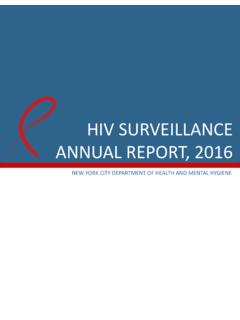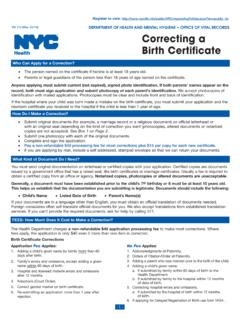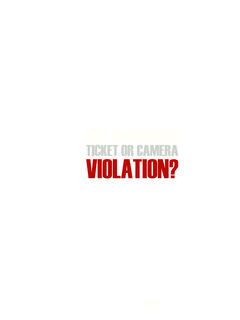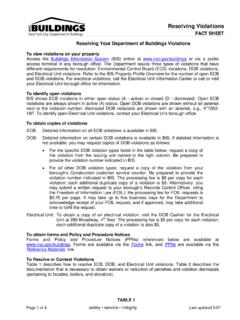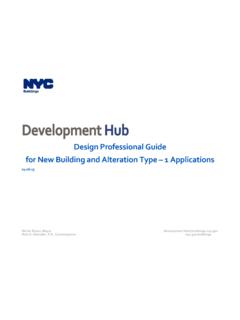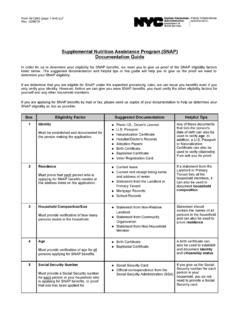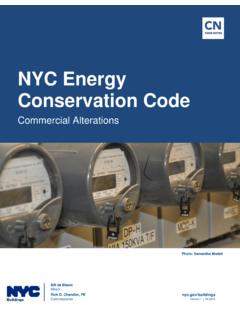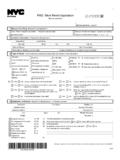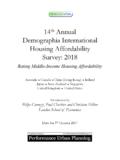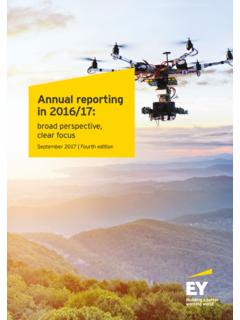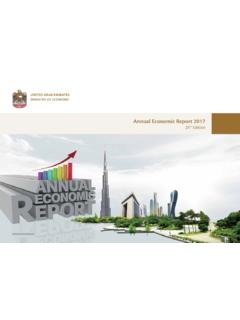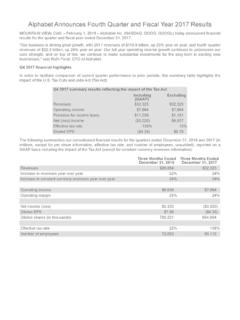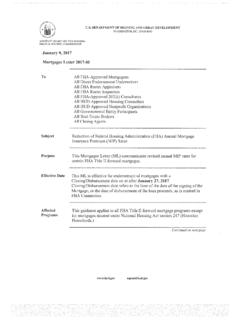Transcription of IN THIS ISSUE When Good Intentions - Welcome to …
1 Ants receive ethics training upon being hired and at least once every two years thereafter. We therefore need to maximize the amount of knowledge public servants acquire in these trainings. Of course, this is easier said than done. Especially when you consider that people tend to learn better when: they don t actively hate the person conducting the training; and they aren t extremely bored. It is for these reasons that the COIB s Education and Engagement Specialists are experts in both the con-flicts of interest law and in audience engagement, us-ing collaborative storytelling, role-playing, and perfor-mance techniques to generate discussion and make the information stick. Enforcement is covered, of course, but primarily for the educational value of past cases. Implicit Bias Implicit bias is another factor which may contribute to an individual s bounded ethicality, and research once again is helpful in identifying reasons why someone with good Intentions might fail to act ethically.
2 For example, experiments show that most people per-ceive their own decisions as more objective and fair rguably, a good ethics law is not a corruption-fighting law (we ve got criminal anti-corruption laws for that). Rather than catching bad people doing wrong, a good ethics law should help good people do right, because, while a very small percentage of pub-lic servants are hostile to ethical principles and will knowingly engage in misconduct, the vast majority do their jobs only with the best of Intentions . Those good people are going to be best served not by attempts to scare them with threats of civil fines or public sanc-tion, but by making them aware that often the ethics ISSUE that s right under one s nose is actually the hardest to spot. Indeed, an extensive body of research shows that there are systematic ways in which people engage in unethical acts without the awareness that they are doing anything wrong.
3 This field of study is known as bounded ethicality that is, our ability to engage in ethical behavior is bounded by various pressures beyond our own conscious desire to be ethical. The bad news: these cognitive processes occur un-consciously. So, without some form of intervention, a good public servant might well miss an ethics situa-tion when it arises. The good news: these processes are predictable and, with the right strategy, agency officials and ethicists can get ahead of them. Let s look at a few examples of bounded ethicality and see how we at COIB address them. Lack of Knowledge The first, and most obvious, contributor to ethical lapses is an inadequate knowledge base. It is very difficult to adhere to a conflicts of interest law if you don t know what the law requires. Is it okay to accept a gift?
4 A tip? Can you use the office printer for an inci-dental personal task? A public servant should always have this information (only if it s worth less than $50; never; probably, but check your agency s Acceptable Use Policy). Fortu-nately, the City Charter requires that all public serv-IN THIS ISSUE Featured Article: Bounded Ethicality Recent Enforcement Cases Public Service Puzzler Winner 1 3 4 Bounded Ethicality The Cognitive Science Behind Ethical Lapses Roy Koshy Editor Volume 19, ISSUE 7 July 2017 Isaiah Tanenbaum, Editor Volume 20, ISSUE 6 August 2018 By Rob Casimir A PLG Unboxing & Advice Hotline Videos 4 than decisions made by others. Logically, we know that most people can t be more fair than most other people. And it seems reasonable enough to believe that, since all of our fairness judgments are inherently egocentric hopelessly biased by our own unique perspective the way we interpret events is probably always going to be just a little bit self-serving.
5 But when this fairness bias is combined with overconfidence bias (where we overestimate our own competence at a task), that s a recipe for ethical winging-it. When people feel like they already know the answer to an ethics question, they don t ask the experts. In an environment where violations of the conflicts of interest law come with real consequences, this is a risk folks shouldn t take. Instead, City em-ployees should be encouraged to use one of COIB s many easily-accessible resources. When speaking with public servants, our trainers em-phasize that reaching out and asking COIB for advice is easy to do (online or on the phone), happens all the time (we get a bunch of calls every day), and carries very little personal risk (all calls are confidential, and anonymity is an option). The goal is to make public servants feel comfortable reaching out to COIB when they face a conflict of interest, so that, as easy as winging it might be, calling for advice feels equally easy.
6 Ethical Fading Bounded ethicality can occur when the ethical nature of a decision fades from view entirely. This, appropri-ately enough, is called ethical fading. Let s say you re a City employee, and one day a friend you haven t seen since college shows up to your office with a stack of tickets to the New York Knicks, which is a famous semi-professional basketball team. Your college friend mentions that he got the tickets through his new job at Big-Time City Vendor, so it s The Ethical Times Volume 20, ISSUE 6 August 2018 no big deal. You take the tickets and go to the game with your family, excited at having seen your old col-lege pal. You learned in your COIB training that you can t take expensive tickets from City vendors. You know that it s always better to call for advice even anony-mously, even if only for a thirty-second chat when you aren t sure how to handle a conflicts ISSUE .
7 But in this case, for whatever reason, it never crossed your mind. That s ethical fading, and it s difficult to com-bat. However, studies indicate that temporal distance in-fluences ethical fading. Which makes sense: when you were sitting in your COIB training 16 months ago, it seemed obvious that accepting fancy tickets from a vendor was a violation of the conflicts of interest law. But now, when you haven t thought about conflicts of interest in over a year and a half? To this end, COIB s Education and Engagement Unit positively bombards public servants with an increas-ingly frequent stream of entertaining and educational ethics-related media: newsletters, contests, plain lan-guage guides, FAQs, posters, pamphlets, and absur-dist training videos, plus daily posts on Facebook, In-stagram, and Twitter. This is the COIB equivalent of checking a clock to see if you re in a dream: by turn-ing ethical check-ins into a daily habit, the average public servant is perpetually primed to recognize con-flicts of interest when they arise.
8 When the moment comes, they ll be ready. A friend and fellow ethicist was once asked, What is something that seems obvious within your profession but the general public seems to misunderstand? She replied: having a conflict of interest isn t the problem, but not doing anything to address it is. And in a world filled with so many competing interests, it is inevitable and understandable that conflicts of in-terest will arise. When that happens, it is important that we present the existence of that conflict not as a manifestation of some great moral failing, but as an opportunity to proactively take steps toward an ethi-cal outcome. And whatever City position we hold, we should constantly strive to help ourselves and our fel-low public servants recognize and address these issues. If you ve got an ethical question, fill out the webform at or call our Attorney of the Day hotline at (212) 442-1400, Mon-day through Friday, 9:00 to 5:00, for free, confidential legal advice.
9 Rob Casimir is a Senior Education & Engagement Specialist for the New York City Conflicts of Interest Board. FAST FACTS Even a well-intentioned public servant can unthinkingly engage in unethical behavior. This is called bounded ethicality. Bounded ethicality results from a lack of knowledge, implicit bias, and ethical fading (among other causes). These cause are unconscious, but predictable and therefore preventable. COIB designs its education and outreach efforts to combat bounded ethicality. Misuse of City Time During the 2015 spring semes-ter, a now-former Department of Education (DOE) Principal had a second job teaching a course twice a week at Borough of Manhattan Community Col-lege. On each day that he taught this course, he ar-rived at his DOE school 90 minutes after the start of the school day.
10 The now-former Principal agreed to pay a $2,500 fine to the Board. Misuse of City Resources; Misuse of Position A DOE Payroll Secretary at a Bronx middle school was responsible for administering a school checking ac-count used to collect student dues and pay for school activities such as dances and trips. He diverted a total of $2,040 from this account into his own pockets by forging the Principal s signature on three checks and cashing them. After a full trial, an Administrative Law Judge (ALJ) at the Office of Administrative Trials and Hearings issued a Report and Recommendation, finding two violations by the now-former Payroll Secretary: 1. misusing City resources by taking $2,040 of DOE funds for his personal use; and 2. misusing his DOE position of official responsibil-ity for the account The ALJ recommended a $10,000 fine, plus repay-ment of $2,040.
